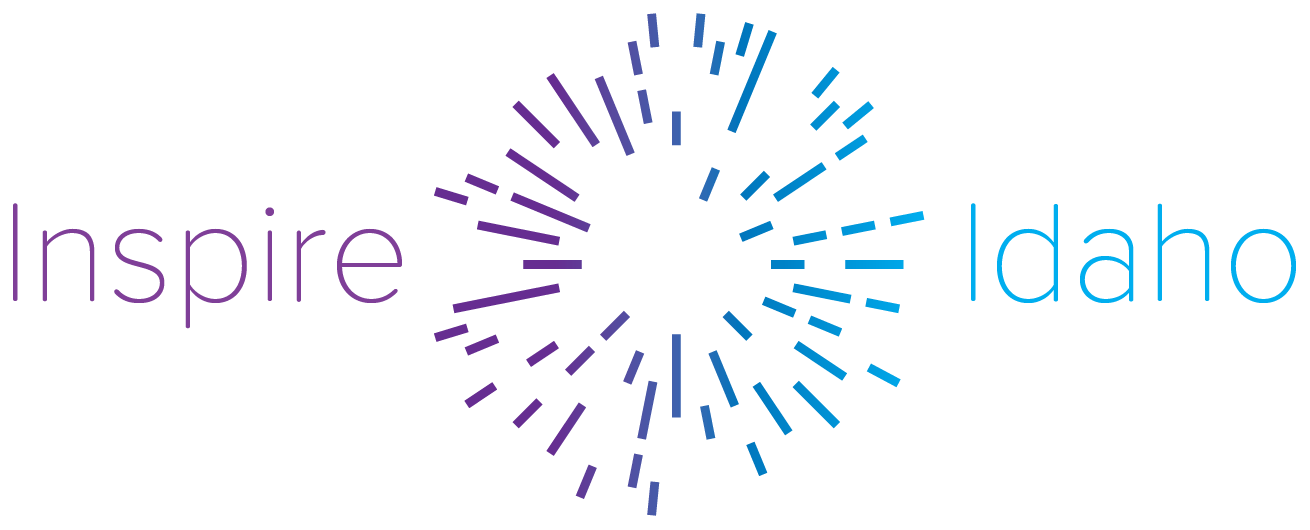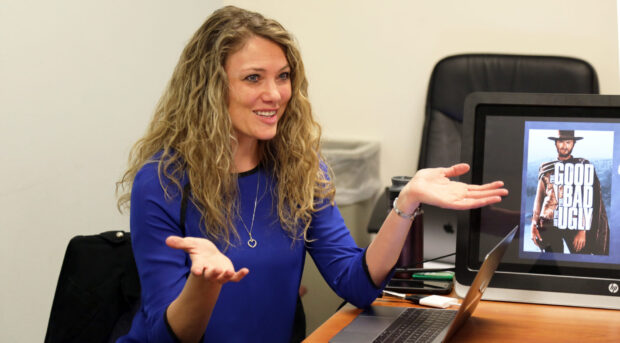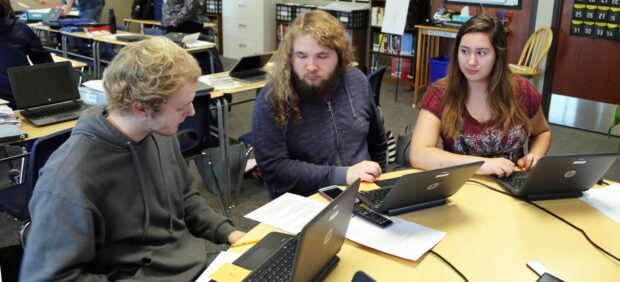
NORTH STAR PUBLIC CHARTER SCHOOL BUILDS STUDENT-TEACHER RELATIONSHIPS
THIS ARTICLE IS PART OF OUR YEAR-LONG SERIES CALLED INSPIRE IDAHO, WHICH SPOTLIGHTS SCHOOLS DOING SOMETHING DIFFERENTLY FOR A BETTER OUTCOME FOR STUDENTS.
EAGLE – Shirley Rau stands at the door way — every day — to greet students as they enter her North Star Public Charter School classroom.
GOOD MORNING... HOW ARE YOU?
WHAT ARE YOUR PLANS FOR THIS WEEKEND?
She's making a connection and building trust with her high school students. The effort is paying off. North Star Charter owns some of the best standardized test scores in the state, attendance is high and discipline incidents are low.
“What we are seeing is incredible,” said Shay Davis, the elementary school principal.
North Star Charter staff started a strategic effort three years ago to develop student-teacher relationships.
For example, Melissa Andersen, the secondary principal at North Star Charter, walks the halls every morning, lunch and afternoon asking students fun facts about themselves.
The concept: When the adults spend time and effort to show students they care about their lives and education, the students, in turn, want to spend time in class with the teachers. Attendance improves. Grades go up. "If students aren't happy they aren't going to learn," said Andersen. "Let's make them feel welcomed and not just another face on campus."
How it works
Seven teachers sit in a small conference room with coffee and a notebook on a Friday morning at North Star Charter. It's training day as these new teachers learn about "The Aspirations Framework" — a strategy to create a healthy teaching and learning environment.
Lisa Lande, the director of field services at the Quaglia Institute for School Voice and Aspirations, is facilitating the training and every teacher at North Star Charter has gone through her exercises in the last three years. Lande is training on "school voice" within three topics:
- Self-worth: In order for students and adults to have aspirations, each needs to feel accepted as a unique individual and valued for the contributions he or she makes to the collective school community. They should know that someone at school believes in them, and feel that their effort and perseverance in life and learning are recognized.
- Engagement: Schools must foster a learning environment for students and adults where they can experience fun and excitement. Adults and students alike need opportunities to be creative and act upon their curiosities, while taking healthy risks, free of fears typically associated with failure or success.
- Purpose: Schools, and the individuals within them, must be encouraged to reflect and act on who they are and what they want to become. Students and adults must be given opportunities to lead and share responsibility in achieving their individual and collective goals. They require others to expect their best effort and provide support as they grow in confidence to take action toward a meaningful, productive, and difference-making future.
Lande's goal is to help teachers re-imagine learning with a true partnership between students and teachers.
"Schools across the world are working to increase student engagement and achievement in the classroom," Lande said. "We believe the starting place for making this happen is to build strong relationships within the school community and to make sure every student and teacher knows their voice is heard and valued."

"When students have self-worth, they are six times more likely to be motivated to learn."
— Lisa Lande
Rau has taught for 30 years with experience at a university, private school and public school. She believes student voice is critical in the classroom. After each lesson, she hosts a "freeway discussion" — an opportunity for students to give feedback about what they learned. This ties student voice with student-teacher relationships.
Rau listens and writes down the feedback to improve her future lesson plans. She is building trust within her students, which opens a two way dialogue — a conversation about learning.
"I am not talking to them about what they should do, we are working in partnership, negotiating new ways of approaching reading, writing and learning," she said. "Students are very knowledgeable about how they engage and learn. They can be insightful in their recommendations about approaches to learning."
Rau has taught for 30 years with experience at a university, private school and public school. She believes student voice is critical in the classroom. After each lesson, she hosts a "freeway discussion" — an opportunity for students to give feedback about what they learned. This ties student voice with student-teacher relationships.
Rau listens and writes down the feedback to improve her future lesson plans. She is building trust within her students, which opens a two way dialogue — a conversation about learning.
"I am not talking to them about what they should do, we are working in partnership, negotiating new ways of approaching reading, writing and learning," she said. "Students are very knowledgeable about how they engage and learn. They can be insightful in their recommendations about approaches to learning."
Lisa Lande, the director of field services at the Quaglia Institute for School Voice and Aspirations, is facilitating the training and every teacher at North Star Charter has gone through her exercises in the last three years. Lande is training on "school voice" within three topics:
- Self-worth: In order for students and adults to have aspirations, each needs to feel accepted as a unique individual and valued for the contributions he or she makes to the collective school community. They should know that someone at school believes in them, and feel that their effort and perseverance in life and learning are recognized.
- Engagement: Schools must foster a learning environment for students and adults where they can experience fun and excitement. Adults and students alike need opportunities to be creative and act upon their curiosities, while taking healthy risks, free of fears typically associated with failure or success.
- Purpose: Schools, and the individuals within them, must be encouraged to reflect and act on who they are and what they want to become. Students and adults must be given opportunities to lead and share responsibility in achieving their individual and collective goals. They require others to expect their best effort and provide support as they grow in confidence to take action toward a meaningful, productive, and difference-making future.
Lande's goal is to help teachers re-imagine learning with a true partnership between students and teachers.
"Schools across the world are working to increase student engagement and achievement in the classroom," Lande said. "We believe the starting place for making this happen is to build strong relationships within the school community and to make sure every student and teacher knows their voice is heard and valued."

